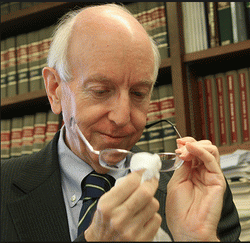If you read just one top-to-bottom dismantling of every supposed premise in support of disenfranchising Photo ID voting restrictions laws in your lifetime, let it be this one [PDF]!
It is a dissent, released on Friday, written by Judge Richard Posner, the Reagan-appointed 7th Circuit Court of Appeals judge who was the one who approved the first such Photo ID law in the country (Indiana's) back in 2008, in the landmark Crawford v. Marion County case which went all the way to the Supreme Court, where Posner's ruling was affirmed.
If there was ever evidence that a jurist could change their mind upon review of additional subsequent evidence, this is it. If there was ever a concise and airtight case made against Photo ID laws and the threat they pose to our most basic right to vote, this is it. If there was ever a treatise revealing such laws for the blatantly partisan shell games that they are, this is it.
Posner's dissent includes a devastating response to virtually every false and/or disingenuous right-wing argument/talking point ever put forth in support of Photo ID voting restrictions, describing them as "a mere fig leaf for efforts to disenfranchise voters likely to vote for the political party that does not control the state government."
He thoroughly disabuses notions such as: these laws are meant to deal with a phantom voter fraud concern ("Out of 146 million registered voters, this is a ratio of one case of voter fraud for every 14.6 million eligible voters"); that evidence shows them to be little more than baldly partisan attempts to keep Democratic voters from voting ("conservative states try to make it difficult for people who are outside the mainstream...to vote"); that right-wing partisan outfits like True the Vote, which support such laws, present "evidence" of impersonation fraud that is "downright goofy, if not paranoid"; and the notion that even though there is virtually zero fraud that could even possibly be deterred by Photo ID restrictions, the fact that the public thinks there is, is a lousy reason to disenfranchise voters since there is no evidence that such laws actually increase public confidence in elections and, as new studies now reveal, such laws have indeed served to suppress turnout in states where they have been enacted.





